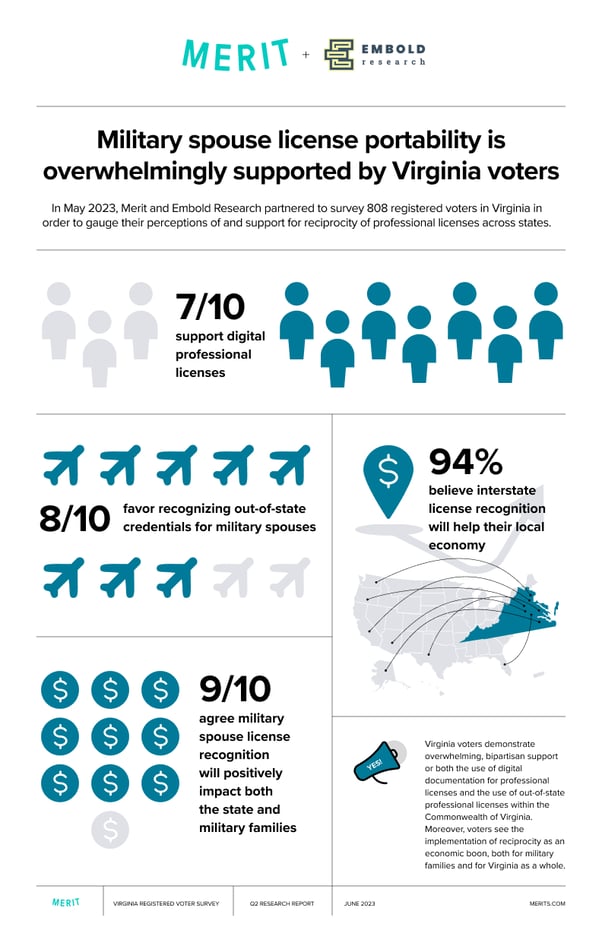Twelve Golden Rules From The Kitchen For Effective Leadership: ‘Mise En Place’
We’ve often been taught that “faster is better” when hustling to get a job done, but during my time working in the catering business, I learned...
2 min read
Merit Jul 7, 2023
.png)
After Laura Schmiegel's husband was transferred by the military for the fourth time in six years, she gave up trying (again) to transfer her legal license. Terron Sims, a West Point graduate and marine, attended nine schools from kindergarten to ninth grade and saw his family separated for years so his mother could keep her job. Ginger Miller was honorably discharged from the military but struggled to translate her license into a career that could support her husband suffering from PTSD.
Nearly fifteen percent of military spouses move their families across state lines each year – compared to one percent for civilians. Eighty-three percent report complications with obtaining license transfers that significantly lengthen to the time it takes to find employment and financial stability.
Most professional and many occupational careers in healthcare, education, transportation, finance, and many other professions require specific training, experience, and regularly renewed licenses for an individual to work in those positions legally. States issue the majority of licenses.
Even though the responsibilities of these careers may only vary slightly from state to state, almost every one requires its own license. Applying and qualifying for new credentials can be lengthy and complicated. Some states require additional hours of training, education, or job experience to do the same work.
Spouses often wait weeks or months for individual licensing boards to process their mutual recognition requests - during which time they can't earn a living. Since our military families often rely on the civilian spouse as the primary breadwinner, waiting to get back to work leads to critical financial instability.
One in ten Merit full-time employees is a U.S. Military Veteran. After hearing about the licensing obstacle among serving families, it was only natural that we became passionate about solving this problem using our technology.
In 2022, we joined forces with a group of advocates, public officials, and veterans to form the Alliance for States Providing Interoperable Reciprocity (ASPIRE) to advance portability and encourage states with reciprocity to implement these reforms.
In May 2023, Merit and Embold Research partnered to survey 808 registered voters in Virginia in order to gauge their perceptions of and support for reciprocity of professional licenses across states.
Merit and Embold Research recently partnered to survey 808 registered voters in Virginia in order to gauge their perceptions of and support for reciprocity of professional licenses across states. The results demonstrate overwhelming bi-partisan support for this initiative.
Almost 80% of surveyed Virginia voters support license reciprocity.
Other critical findings include that one-third of participants believe their military neighbors experience financial instability to the point of frequently struggling to pay their bills.
The Virginia survey also shows voters:

With clear support and the promise of improved local business success, why are so few states adopting or implementing reforms? 34 states have already passed legislation, but even there, advances in improving the process, such as digitization of credentials or clear pathways to simplify their transfer, have yet to be funded or begun.
Besides political opposition from some organizations, states may hesitate to adopt reciprocity because they don't have the technology needed to make portable and transferable licenses a reality.
Modern verified digital licensing systems would replace siloed systems and enable states to:
Survey participants shared their strong desire to see military spouses and veterans return to work in their licensed professions as quickly as possible through credential reform.
The states that lead the way in granting and recognizing reciprocal licenses will drive economic growth for their communities and, most importantly, improve the lives of military families.
Download the infographic today and see how voters feel about license reform.
We’ve often been taught that “faster is better” when hustling to get a job done, but during my time working in the catering business, I learned...
Your people are your most valuable asset and your biggest competitive advantage. Invest in them wisely, and they’ll take your company places you...
Big workforce initiatives thrive on strong collaboration between ecosystem partners; however, navigating those projects may sometimes be challenging....